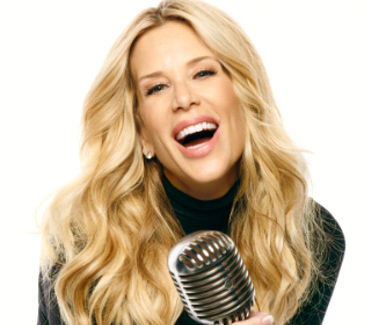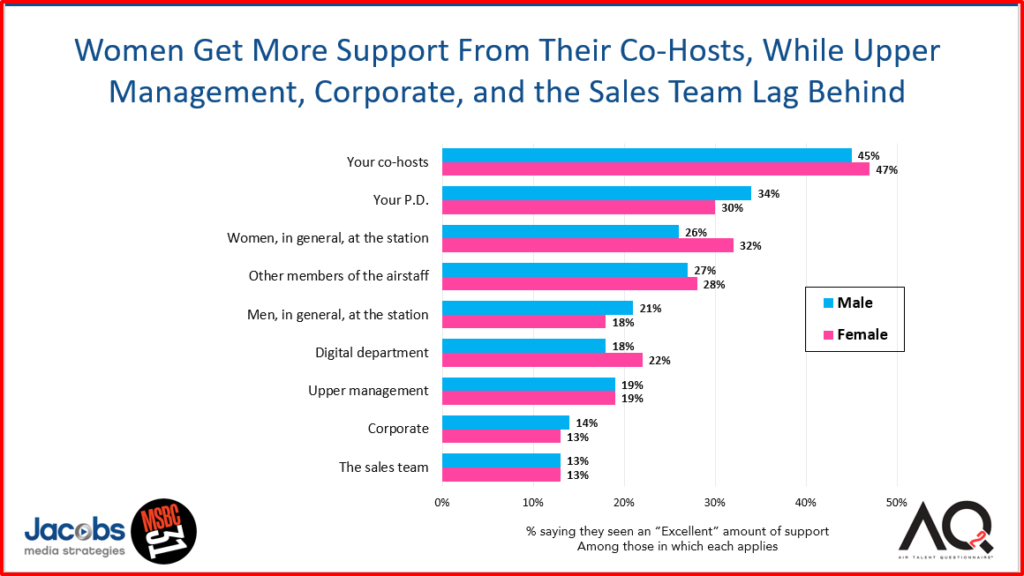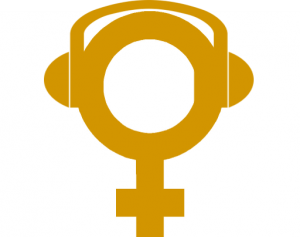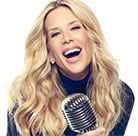Women In Radio: The Next Chapter Or The Same Old Story?
August 19, 2019 | Fred Jacobs
Jacobs Media
It’s been another interesting chapter in the saga of women in radio. Like every industry, broadcast radio has diversity challenges — and we saw that up close and personal at Morning Show Boot Camp 31 this month in Chicago, as well as in the charts and graphs in AQ2, our talent on talent survey we’ve now conducted for the second consecutive year.
On the surface, the environment appears to be improving for women in radio. But when you start digging a little deeper, you can’t help but encounter some of the same congenital issues. As our AQ study shows, men outnumber women on the air by a 3:1 ratio — same as last year. And that starts an important conversation about the state of the medium, whether it’s in morning radio or even when it comes to voiceover work.
 To be sure, some women are hitting it out of the park. Those seeking a shining success story should look no further than the trajectory and accomplishment of KOST/Los Angeles morning star, Ellen K. As most people in radio know, Ellen was the sidekick for two morning show superstars — Rick Dees and Ryan Seacrest — before striking out on her own.
To be sure, some women are hitting it out of the park. Those seeking a shining success story should look no further than the trajectory and accomplishment of KOST/Los Angeles morning star, Ellen K. As most people in radio know, Ellen was the sidekick for two morning show superstars — Rick Dees and Ryan Seacrest — before striking out on her own.
While those partnerships were no doubt an important part of Ellen’s learning curve, she sought to go solo in 2015 — and hasn’t looked back.
Like many in radio, Ellen got her start while at college, and interned at WXUS in Lafayette, Indiana. While the beginnings of her career were in a small market, she makes no bones about the need for women to think big — the majors:
“The biggest payday should always be in the biggest markets simply because the ad revenue is so large, but the biggest payday isn’t always the path to happiness. I’ve been happy in the smallest market I’ve worked in because I love the radio business.”
But whether in L.A. or small towns, Ellen K has always relished the personal connection, whether it’s on the studio lines or out in public, connecting with her audience.
Kudos to Ellen for carving out a great career in a tough business. But then there’s the rest of the radio world.
And judging by the “Women’s Forum” at Morning Show Boot Camp, the radio industry has a long way to go.
Led by the solid and steady moderation of Elizabeth Kay (WMYX/Milwaukee mornings), the panel was comprised of outspoken women in radio who discussed how they navigate the many speed bumps they’ve encountered over the years — and today.
And of course, there’s the gap between how men behind the mic think about women’s chances to advance are — and how women approach the same question. As you can clearly see below, they see two very different industries and disparate realities:

Not surprisingly, that gap we saw in 2018 continues today, underscoring the challenges radio has to provide not just diversity, but opportunity.
Much of the way in which women perceive their chances has to do with support — and where it comes from. In AQ2, we asked the entire sample about where they derive the most support across the spectrum of people, co-workers, and managers in which they have contact. While the answers don’t deviate greatly among the genders, it is clear that women feel their co-hosts and other women at the station are most likely to have their backs.
On the opposite end, they point to upper management, corporate, and sales as least likely to be supportive. That’s not a great set of circumstances.

Interestingly, Ellen K provides advice for fledgling broadcasters;
“Find a top seller to give you tips on ways to keep a long-term advertiser or land a new one. Finding creative ways to bring revenue is always a top priority.”
Connecting with revenue and how it is generated came up at Boot Camp, too. As the radio industry struggles to reach its financial goals, women — and all on-air personalities — have a chance to prove their ROI and become even more valuable to the enterprise.
That’s all well and good, but this issue of a lack of support among management may, in fact, be the central theme behind women’s frustration. And while it came through loud in this year’s AQ2 study, it may be one that air personalities in general — and women specifically — have felt for eons.
 But at this important junction in the country’s trajectory — and the ways in which people are presented and represented in the media — support needs to come from the entire organization, especially those in influential and power positions.
But at this important junction in the country’s trajectory — and the ways in which people are presented and represented in the media — support needs to come from the entire organization, especially those in influential and power positions.
I felt that sting in my AQ opening session at Morning Show Boot Camp. Elizabeth Kay asked a question about the fate of aging female on-air personalities and whether they have a fair shot at continued success. While I provided a truthful answer, I did so hastily, moving to get to the next questioner and to stay on time.
After having a post-MSBC conversation with Elizabeth, I realize that like so many others in positions of power in radio, I have to be a better listener, especially when it comes to hearing from those who are striving to advance but often are unheard or ignored.
We all do.
